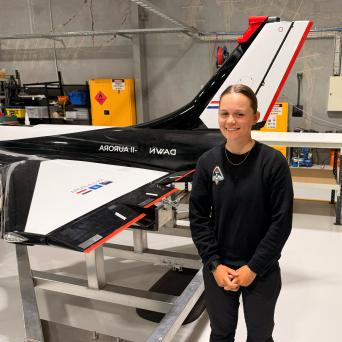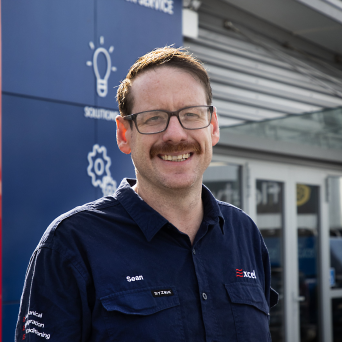When cities build higher, the risks build too. With Auckland growing up as fast as it’s growing out, the demand for skilled fire protection installation tradespeople has never been greater. Global Fire is meeting that challenge head-on, celebrating 12 team members who have completed their New Zealand Certificate in Passive Fire Protection Installation (Level 3) through industry training organisation Competenz. Not only is the nationally recognised qualification strengthening company competency, but it’s also lifting standards sector-wide.
Part of a family-owned business since 1991, Global Fire has become one of New Zealand’s most trusted passive fire specialists. With four offices across the North Island and projects delivered nationwide, the company combines reach and capability with a people-first culture that puts training at the centre of its success.
For Commercial Manager Steven Liu, investing in people isn’t optional, it’s what keeps the business ahead. “Passive Fire is changing fast, and we’re committed to staying on top of it so the advice we give our clients is the best in the industry. It’s a great time to be in the sector because there are rich opportunities to learn and grow. New Zealand has been 10–15 years behind other countries, but now we’re catching up,” he says.
That commitment has seen Global Fire trusted with some of New Zealand’s highest-profile construction projects, from the Waterview Tunnel to the New Zealand International Convention Centre. The company also partners with large construction firms nationwide, delivering large-scale solutions where safety, compliance and quality can’t be compromised.
Steven’s own training journey reflects the culture he champions. Alongside his Level 4 Passive Fire Protection qualification, he has studied property, construction, project management and contract administration. It’s knowledge he applies daily. “Lifelong learning makes you more resilient and better equipped to solve problems. That mindset has filtered through Global Fire, and it’s why training is baked into our culture, not treated as an afterthought.”
It's also why Global Fire has a dedicated in-house training manager with technical expertise responsible for linking theory with practice. Today that role is carried out by Phil Logan, Technical Compliance Officer, who facilitates training nights every fortnight, helps learners stay on track, and provides additional support where needed — including interpreter assistance to ensure the company’s large Filipino workforce can participate fully. Steven says this practical, hands-on leadership makes training more accessible and effective across the business.
Global Fire Technical Manager Karlos Radovanovich has taken a different training route, kicking off his career in the construction industry fifteen years ago. Earlier this year, he completed the Level 3 New Zealand Certificate in Passive Fire Protection Installation, a milestone that gave him confidence and a deeper understanding of compliance. Today his role spans guiding staff, surveying jobs, preparing quotes and managing compliance — a mix he relishes for its problem-solving.
“I came into fire from an interiors background, and thought I had a fair idea, but once you’re in the trade, you realise how much there is to learn. The hands-on training gave me real respect for what our installers do every day,” Karlos says. “If you’re keen to push yourself, the support is always there, whether it’s training nights, mentoring from senior staff, or backing from leadership. Global Fire really does treat you like whānau, and that makes you want to stay and keep growing.”
That combination of formal training and accountability is also embedded in Global Fire’s quality assurance. Every cable penetration and seal is photographed and logged in an app before handover. On large projects, that can mean at least tens of thousands of penetrations. The digital register records the exact location, installer and time of work, creating a permanent record for councils and clients. Says Steven, “Having a full visual record means we can track and train our people, but more importantly it ensures building owners and occupants know their safety is being protected in the right way.”
Steven believes partnering with training organisation Competenz has been vital to Global Fire’s training success. “Competenz have been really helpful and I’ve learnt a lot through my own Level 4 training. The way they teach you to think about how things connect, and how to meet the building code, gave me a depth of knowledge I apply to every job. They listen and engage with industry, even taking feedback from us to adjust some Level 4 modules so they’re fit for purpose. That’s what a true training partner looks like.”
Karlos agrees, crediting both Phil and Competenz Training Advisor Tony Gunby for making his progress possible. “Tony would give me a push every now and then if he thought I needed support, and I had the reassurance I was doing the learning right. Without this set-up, earning the qualification would have taken me longer.”
Tony regularly visits the team to keep them on track, ensuring they’ve got the help they need to get qualified. He says Global Fire’s proactive approach is what sets them apart. “Global Fire operates in a competitive market, and by upskilling their workforce they stay competitive and give customers confidence the work will be done correctly and to code. Having a dedicated technical manager overseeing learner progress, while working with us to track unit completion, gives their people the best chance of success. We’re proud to be their training partner.”
For Global Fire, training is about more than compliance. Every qualified installer contributes to keeping people safe in the event of fire. It’s a responsibility the team take seriously. “Passive fire protection is often invisible, but it saves lives. By investing in qualifications and a culture of learning, we’re making sure our workforce is not only technically skilled but also proud of the life-saving impact of their work,” says Steven.



.jpg)


.jpg)

